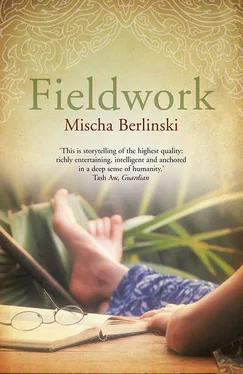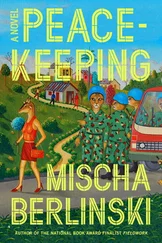After lunch, every afternoon in the heat of the day, Martiya and Karen went swimming. There was a small clear pool at the base of a steep waterfall an hour's hike from the village. Although the pool was small, the water was deep, and local legend held that at the very bottom of the pool was a rock in the shape of the seated Buddha. To touch this rock was a means of making merit, of ensuring oneself in however small a degree a more favorable reincarnation. Karen was a strong swimmer; even so, she was never able to swim down deep enough to find the rock and examine it. But Martiya claimed to be able to do it. The trick, Martiya said, was to dive into the pool from the rock ledge that overhung the waters. Martiya dove and disappeared into the darkness, and Karen became slightly nervous waiting for her friend as the waters smoothed over and became calm, with Martiya still someplace deep underneath. Only when the waters were perfectly still did Martiya burst up out of the water, panting for breath, the sun reflecting off her dark hair and lean, flat face.
A day or two before Karen was scheduled to return home, Dan Loi was blanketed in a heavy mist, which Martiya told Karen was almost unheard of at that time of year. But there it was: the village and valley were enshrouded in mist so thick that Karen could no longer see the summits of the near hills or even the shrine of Old Grandfather just down the road; the village became perfectly quiet except for the sad cawing of the kiss-me birds and the gentle drip of water from the heavy trees. It was a mist so thick that Karen would not have been surprised at all to see a dinosaur strolling down the red-dirt lane. Martiya told Karen that she liked the mist: it reminded her of rainy season, cozy mornings with her book, and of rice planting. But Karen thought that the mist transformed Dan Loi into just about the spookiest place she had ever seen, the way the villagers wandered out of the mist, then disappeared back into it. In the end, she was glad to get out of there.
That visit to Dan Loi was the last time Karen saw Martiya. She had meant to go back to Thailand again, but not long after returning to Wisconsin, one of her grant applications — to study rainmakers in West Africa, an idea that came to her in Dan Loi, while watching the shaman — was finally approved. Between her own fieldwork and then the new job in Texas and then meeting Paul, which was altogether another story, and then the kids, the years slipped by. She and Martiya continued to write to each other, but with time the letters passed across the Pacific less and less frequently, until finally the correspondence came to a halt. Then a man named Gilles called, saying that Martiya was in jail.
"I thought he was crazy," Karen said. "I tell you, I didn't believe him. I thought he was trying to get money out of me or something. I mean, he sounded so weird . But then I got so curious, and I wrote him and he wrote me back that she had killed a missionary, so I wrote her, and I wrote her again, and she never replied, and then you wrote me, and God, I feel so bad. I should have done something to help her when I had the chance."
GILLES BLOUZON FOUND THE HOUSE WITH MARTIYA—an old teak house with a gabled roof that curled at the eaves. They'd been roaming on Gilles's motorbike, nothing more than a Sunday drive, and when he saw the old house, with its stupendous view of the plains, Gilles said to himself, "This is the house where I wish to pass my retraite ." Buying property is a complicated business for the foreigner in Thailand, but Gilles was patient: it was in his retraite that he, like every Frenchman, imagined that his real life would begin. He signed the papers with a vision in his sleek, seal-like head: a sunny afternoon in cool season; Gilles in the garden, pottering away; and Martiya looking out on him indulgently from the window of the kitchen, where she was preparing a tasty Dyalo daube . But when Martiya left him, Gilles took stock not only of this failed romance but also of the general trajectory of his life and decided to leave the University of Chiang Mai, where he had spent the last five years as a professor of botany, a specialist in the life cycle of bamboo. He found a position at the University of Grenoble, and returned to France. This was in 1988. The teak house was shuttered and boarded up. A family of owls nested in the eaves.
When Gilles left Thailand, he had resolved to sell the house; but selling property in Thailand is almost as complicated a business as buying it, and he held on to the house for almost ten years. This was good fortune: only months before Gilles was scheduled to begin his retraite , he was interviewed for The Guardian by a pretty Englishwoman named Vivian who was interested in the biological effects of deforestation in Bangladesh. Gilles married Vivian not long thereafter. I recognized Vivian's name, as will many of my readers: she is now The Guardian 's Southeast Asian correspondent. She famously reported from Tianamen Square, and was the first journalist in Asia to interview Pol Pot's second-in-command. Gilles and Vivian now made their headquarters in the house that Gilles found with Martiya.
I stood beside him in his garden.
"All that ," Gilles told me with a sweep of his hand. "All that I planted."
Laterite blocks formed walkways through the jungle-like profusion. Gilles named species with a flick of his forefinger as we walked: ficus, banyan, monkeypod — these were the shade trees already on his property when he arrived; but it was Gilles who planted the Persian lilac, the jasmine, the jacaranda, the perfumed frangipani and the lantana, with its pungent smell of smoke and garbage. We paused beside a lipstick tree, and Gilles pointed out a flame tree, a flame vine, and a fire bush. Bougainvillea bloomed in purple, magenta, orange, white, pink, and crimson. A passion flower drooped—"He needs less sun," Gilles said, "I am going to transplant him" — but the golden trumpet, the pink trumpet, and the blue trumpet were all in blossom. Lilies and lotuses in tall vases floated on murky green waters.
But the flowers, the trees, the shrubs, the vines, the exotics, the water plants, the palms — coconut, palmrya, taliput, and fishtail — were all preamble to the bambou . Land being cheap in Thailand, Gilles had bought almost a half acre of adjacent property on which to indulge his passion.
"Bambusa andinacea," he said as we walked, petting the stalks fondly as another man might stroke the muzzles of his favorite dogs. "The giant thorny bamboo. Bambusa pallida. Bambusa polymorpha. Dendrocalamus giganteus. "
The list went on.
"Have you ever seen a bamboo flower?" Gilles asked abruptly.
His excitement mounted, and it was easy to see what might have attracted Martiya, and subsequently Vivian, to the man. But I could also see why Karen Leon might have thought that he was a weirdo.
"The bamboo, she is a sexually timid but intensely passionate grass," Gilles continued, not waiting for my answer and pointing at an abashed-looking green stalk. " Bambusa vulgaris , this one, she flowers once every one hundred fifty years, and when she flowers, she flowers everywhere! All of the bamboo, after decades and decades of calm, now suddenly decides it is time to wake up and flower. And then, once it has flowered and reproduced and the baby bamboo shoots, all of the old bamboo all over will die. All at once. How does bamboo everywhere know that it is time?"
"I don't know," I said.
"Of course you don't know! Nobody knows! I've been studying the bamboo a lifetime, and nobody knows . It is one of the most fantastic mysteries on Earth. Bamboo in Brazil and Bamboo in China, exploding at once in bamboo flowers. Nobody alive today has ever seen Bambusa vulgaris in flower! It last flowered in 1860. But it's coming! In just a few years — I hope I will be alive — it will flower again — I'm waiting — after all this time — the explosion — I think that I can feel it coming! But it will be a catastrophe, and nobody is ready. It will be a terrible thing.
Читать дальше












